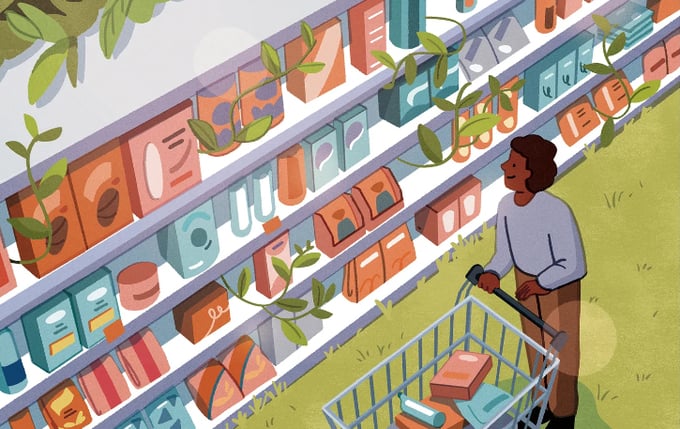November 27, 2025 | 23:56 GMT +7
November 27, 2025 | 23:56 GMT +7
Hotline: 0913.378.918
November 27, 2025 | 23:56 GMT +7
Hotline: 0913.378.918

IN 2020, DURING the depths of the Covid-19 pandemic, concerns around food supply were high. This prompted big changes to the way some food is produced: There was a rise in the use of regenerative farming principles—methods of growing food that also support nature by, for instance, keeping soils healthy and stable, improving water and air quality, and improving local biodiversity—and an expansion of food production in and close to cities, leading to less waste.
In 2021, PepsiCo, Danone, Nestlé, and Unilever—vast, multinational, fast-moving consumer goods (FMCG) companies—announced they were adopting regenerative agricultural practices across millions of acres of farmland. This has been complemented by growth in urban farming, with vertical farming business Infarm recently opening the largest urban farm in Europe, covering 10,000 square meters. These are significant steps toward a food system that is resilient and better for people and for nature.
Today we know that building food systems that are resilient to shocks such as the pandemic is no longer enough. In 2023, we will be redesigning food to also help us solve pressing global challenges including climate change and biodiversity loss.
For that to be possible, the whole system needs to be regenerative by design. This means that rather than bending nature to produce food, food needs to be designed for nature to thrive. In 2023, FMCGs, retailers, and innovators will take up this mantle, working with farmers to begin creating a circular economy for food.
They will start to choose ingredients that aren’t only regeneratively produced but are also lower-impact, diverse, and upcycled. For instance, rather than making breakfast cereals using only wheat grown with conventional methods, the same product can be made from a mixture of wheat and peas grown using regenerative farming methods. According to a recent study, making cheese, cereal, and potato products using this approach could reduce greenhouse gas emissions from the food industry by 70 percent and reduce its impact on biodiversity loss by 50 percent in Europe. This is hugely significant given that the current food system is the primary driver of biodiversity loss globally and is responsible for a third of all human-made greenhouse gas emissions.
We’re already seeing seeds of change that will grow in 2023. Brazilian coffee producer Guima Café, supported by Nespresso and reNature, is becoming a regenerative coffee farm, producing more types of ingredients from the same land and diversifying its offering. Products that are made with upcycled ingredients are appearing on supermarket shelves, including Renewal Mill’s Dark Chocolate Brownie Mix and Seven Bro7hers’ Sling It Out Stout, brewed using upcycled Kellogg's Coco Pops. British food company Hodmedod is seeking out less-well-known but lower-impact foods like the fava bean and black badger peas.
Policymakers are also taking action. For example, in the UK, new government schemes reward farmers and land managers for services such as ensuring that clean and plentiful water is available to plants and wildlife, allowing them to thrive and contributing to climate change reduction and adaptation. Pilots are already running and, in 2023, more land managers in the UK will be taking part.
This is only the beginning. In 2023, we will see the launch of an innovation challenge—supported by the People’s Postcode Lottery—aimed at FMCGs, retailers, and food innovators to bring more iconic food products made with lower-impact, diverse, upcycled, and regeneratively produced ingredients to market. The development of these products will showcase the potential of circular design for food. 2023 will signal the beginning of redevelopment of entire food portfolios, designed for nature to thrive.
(wired.com)

(VAN) A new study reveals how the simultaneous effects of ocean acidification, salinity and loss of oxygen are making the world more fragile.

(VAN) Hopes are growing that the creation of the first 3D turkey gut model could be a turning point in the battle against the virulent blackhead disease.

(VAN) Tyson, America’s biggest meat supplier, plans to shutter one of its largest beef processing plants as the industry continues to struggle with low cattle supplies and political pressure from Washington.

(VAN) New FAO study shows how digital solutions are empowering farmers and fishers to prevent losses and build resilient agrifood systems.

(VAN) Brazil's COP30 presidency pushed through a compromise climate deal on Saturday that would boost finance for poor nations coping with global warming but that omitted any mention of the fossil fuels driving it.

(VAN) Poultry farmers in the UK have been warned that they could face one of the worst winters yet for bird flu.

(VAN) Prices of main-crop paddy have risen sharply, with jasmine rice hitting 16,100 baht per tonne — the highest level in years.